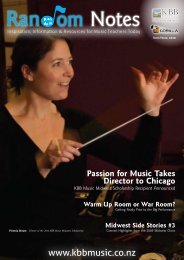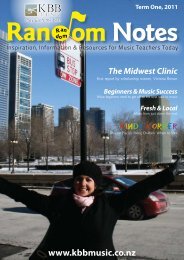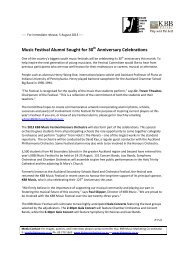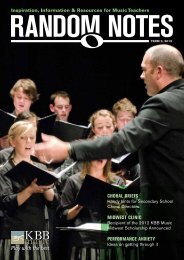ukulele teaching tips midwest clinic dealing with the voice - KBB Music
ukulele teaching tips midwest clinic dealing with the voice - KBB Music
ukulele teaching tips midwest clinic dealing with the voice - KBB Music
Create successful ePaper yourself
Turn your PDF publications into a flip-book with our unique Google optimized e-Paper software.
CHORAL BRIEFS<br />
Handy hints for Secondary School Choir Directors<br />
Dealing <strong>with</strong> <strong>the</strong> Voice<br />
by David Squire, Schoir Ltd<br />
The beginning of <strong>the</strong> year is usually a frantic time for<br />
choir directors and music departments in general, and<br />
any preparation that has already occurred at <strong>the</strong> end of<br />
<strong>the</strong> previous year pays dividends at this time. By now<br />
I’ve usually sorted almost all of my repertoire for <strong>the</strong><br />
year, and most of my choirs are auditioned and ready to<br />
go (more on this in a future edition of Random Notes!),<br />
so it’s just a case of getting going.<br />
If you’re like me, <strong>the</strong>re’s probably a little trepidation<br />
mixed in <strong>with</strong> <strong>the</strong> excitement of <strong>the</strong> first rehearsal.<br />
While <strong>the</strong>re is hopefully refreshment and optimism<br />
post-holiday, <strong>the</strong>re is also <strong>the</strong> realisation<br />
that everything starts from scratch again<br />
and <strong>the</strong> first sound that you hear from <strong>the</strong><br />
choir will likely be raw and probably ei<strong>the</strong>r<br />
somewhat insipid or rough. Never fear! This<br />
is <strong>the</strong> perfect time to instill some good skills<br />
in your singers and set <strong>the</strong>m on a course for<br />
musical success.<br />
The first thing is to get <strong>the</strong>m singing,<br />
and spend some time developing vocal<br />
technique in a group setting as soon as <strong>the</strong>y get going.<br />
The advantage of this is that you can achieve a better<br />
sound almost instantly, and develop good vocal habits<br />
that can be applied to all <strong>the</strong> styles of music being<br />
sung. The group approach to vocal technique is a much<br />
lower threat to those singers who might be nervous<br />
about being singled out, and also enables you to craft<br />
a choral sound that is more consistent across <strong>the</strong> choir.<br />
Note that this does not need to happen in isolation<br />
– use your repertoire and highlight areas that need<br />
attention as <strong>the</strong> singers learn <strong>the</strong> music.<br />
Since <strong>the</strong> choral director deals <strong>with</strong> only one instrument<br />
(albeit an instrument <strong>with</strong> many variations), it makes<br />
sense that <strong>the</strong>y should know at least <strong>the</strong> basics of vocal<br />
technique. This is particularly important when <strong>dealing</strong><br />
<strong>with</strong> adolescents, as most are in <strong>the</strong> crucial phase<br />
of <strong>the</strong> changing <strong>voice</strong>. I would strongly recommend<br />
getting on-side <strong>with</strong> a competent singing teacher and<br />
asking <strong>the</strong>m to ei<strong>the</strong>r assist you in rehearsal or, at <strong>the</strong><br />
very least, give you some idea of <strong>the</strong> different facets<br />
of <strong>the</strong> vocal mechanism and how to enable <strong>the</strong>m to<br />
work in a healthy, functional manner. If you are based<br />
in a more remote region where <strong>the</strong>re are no singing<br />
teachers suitable for this, consider inviting one to your<br />
area to take a weekend workshop. You could even<br />
band toge<strong>the</strong>r <strong>with</strong> o<strong>the</strong>r like-minded people in order<br />
to spread <strong>the</strong> costs of such a venture. If this is still not<br />
feasible, try borrowing or buying some suitable books<br />
about vocal technique for choral singers. Some of <strong>the</strong>se<br />
are from a somewhat scholarly perspective (e.g. Richard<br />
Miller) and some provide <strong>tips</strong> for a more practical, chalkface<br />
scenario (e.g. Tim Seelig).<br />
“...<strong>the</strong> best choirs enhance <strong>the</strong> musicianship of<br />
<strong>the</strong>ir members and make <strong>the</strong>m better singers,<br />
since it is more than likely that <strong>the</strong>se choirs<br />
demonstrate elements of healthy vocal technique<br />
in order to achieve <strong>the</strong>ir distinctive choral sound.”<br />
Some singing teachers refuse to allow <strong>the</strong>ir students to<br />
sing in choirs. There are a number of reasons for this<br />
(and not all are valid), but <strong>the</strong> fact remains that a good<br />
choir consists of a majority of capable singers who<br />
have at least a basic understanding of how <strong>the</strong>ir <strong>voice</strong><br />
works. I also believe that <strong>the</strong> best choirs enhance <strong>the</strong><br />
musicianship of <strong>the</strong>ir members and make <strong>the</strong>m better<br />
singers, since it is more than likely that <strong>the</strong>se choirs<br />
demonstrate elements of healthy vocal technique in<br />
order to achieve <strong>the</strong>ir distinctive choral sound.<br />
There are two major differences between singers and<br />
o<strong>the</strong>r musicians. The most obvious one is that <strong>the</strong><br />
instrument is not ‘attached’ to <strong>the</strong> body like a violin,<br />
trumpet or piano. Since <strong>the</strong> sound is created almost<br />
completely inside <strong>the</strong> body, it is much more difficult to<br />
explain to a young singer how to alter <strong>the</strong>ir technique.<br />
The science of singing (or vocal pedagogy) is constantly<br />
changing as experts develop a greater understanding<br />
of how <strong>the</strong> <strong>voice</strong> works, or revise obsolete ideas<br />
that may have once been considered gospel. This<br />
10 Random Notes <strong>Music</strong>al Instrument Specialists since 1888

















